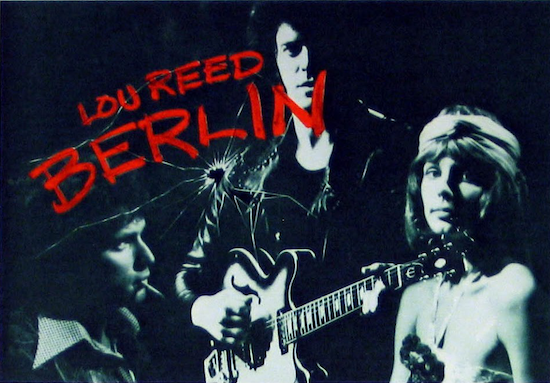It’s 1973 and Lou Reed is rising from the underground, like the vapour emerging from the subway on Loaded’s cover. The double-punch of last year’s November arrivals, ’Walk On The Wild Side’ and Transformer, have elevated Reed finally from the doldrums of cult star status. The 45 is a transatlantic top 20 hit, the album climbs to a US number 29 and a UK number 13. It’ll chart even higher in Holland and Australia. Velvets superfan Bowie has co-piloted his ascent. Ever since meeting at NYC’s Ginger Man restaurant in September 71, the RCA label mates have been moving closer towards each other, Bowie wooing Reed with a dozen roses spray-painted gold, the pair caught by Mick Rock’s lens kissing at London’s Dorchester Hotel. Reed says he’s eager to learn from the thunderbolt-fast Bowie, who co-produced Transformer with Mick Ronson, tarting up Reed’s tunes with hard-rock swagger, classically tinged prettiness and tuba-powered campery.
But while Transformer taps into the glam rock zeitgeist, contemporary ads make it clear who got there first: “In the midst of all the make believe madness, mock depravity and pseudo sexual anarchists – Lou Reed is the real thing… the original.” Transformer elegantly stitches together fragments for a world that is quickly catching up; Velvet off-cuts, songs that sound like an abortive Warhol musical, ‘Walk On The Wild Side’ taking its title from a 1956 Nelson Algren novel. ‘Perfect Day’ captures an early date with Bettye Kronstad (the pair married in January 73), when Reed, in post-Velvets exile at his Freeport childhood home, would take the Long Island train into the city. It’s magically poignant, an idyllic snapshot frozen in time, its edges darkened by impermanence and a New Testament proverb. By the end of 73, Reed’s marriage will be over, as will his dalliance with glam and the hit parade. ‘Perfect Day’ could be the tender moment missing from Caroline and Jim’s saga on next record, Berlin.
Warning signs flicker across Transformer’s cover, which Reed tells Disc & Music Echo is "divine", perhaps a nod to dialogue from 72’s Cabaret (“divine decadence, darlings!”) On the back, a priapic stud, straight from the pages of a gay porn mag, stares at model Gala Mitchell, her drag-like glamour framed in what looks like a mirror, as if the butch caricature was looking at another potential self. It’s an immaculate construction, taken by Roxy album lensman, Karl Stoecker, right down to the tumescent bulge in road manger Ernie Thormahlen’s jeans (a banana stuffed in a sock). The front features Reed photographed by Mick Rock on 14 July 72, onstage at the Scala in Kings Cross, in full glitter rock regalia (or as Rock puts it “the degenerate side of glam”). Beneath the high voltage lettering Reed is part Sally Bowles, part Boris Karloff, part Pierrot, part sad panda. Behind those vacant, zombie-like eyes could be anything; loneliness, boredom, helplessness. His white pancake make-up, black lipstick, eyeliner and nail polish will see him dubbed “the phantom of rock” – apt for a man lost inside a mask, who isn’t quite there.
Unease runs through Transformer’s critical reception too, far chillier than the public’s reaction. “A cockteaser,” says Rolling Stone, urging him to “forget this artsy-fartsy kind of homo stuff.” “The Lou Reed chic album,” snorts the NME’s Nick Kent, as if it is a bad thing. The New Yorker’s Ellen Willis rolls her eyes at the “pseudo-decadent lyrics,” Disc & Music Echo get closer to the album’s heart with three adjectives: “beautiful, sad, funny”.
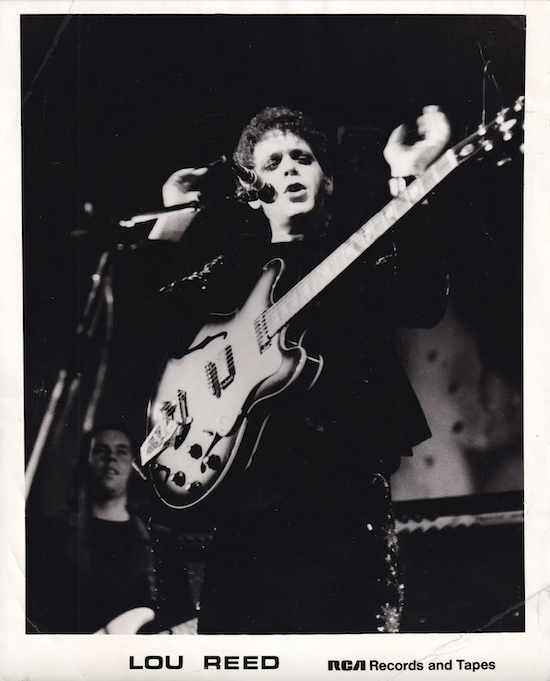
Despite his outward contempt for critics, the bad reviews always hurt Reed and their discomfort with his wild mutation mirrored his own ambivalence. He started 73 telling LA’s KMET radio that glitter rock’s potential was fantastic but that weird scenes had unfolded on the Transformer tour. Bouquets of flowers were tossed onstage. At a show in Buffalo that March an overeager fan bit Reed on the buttocks while he prepared to launch into ‘Waiting For The Man’. The fan yelled, “Leather!” while running for the exit, successfully evading capture, causing Reed to complain that America “seems to breed real animals”. With his nerves jangled by fame’s harsh spotlight, Reed self-medicated with Johnnie Walker Black Label scotch, disappearing into rooms to shoot speed.
There was a nagging sense from scribes that his most famous fan was devouring him. Melody Maker accused him of being sucked into the “cultural vortex” of “a second rate plagiarist”, decking himself out in ill-fitting attire “tottering on and offstage in silver heels like an ageing whore". But even back in 72 Reed told Disc & Music Echo: “I’m not going in the same direction as David.” Throughout 73, Ziggymania intensified, but Bowie’s influence on Reed waned. Reed’s black velvet bolero suit, with its sequins and rhinestone trimmings, bought with Angie at London’s Granny Takes A Trip came off. As did the make-up. In a June edition of NME he told Nick Kent his next record would be “a backlash on Transformer”.
On 9 April 73, Reed performed at Toronto’s Massey Hall. In the audience next to RCA A&R man Dennis Katz was producer Bob Ezrin. Dazzled by support act Genesis frontman Peter Gabriel, the 24 year old Canadian turned to Katz, who’d been managing Reed, and asked: “Can you get me the guy with the flower on his head?” Ezrin would go on to produce Gabriel’s solo debut Car (1977), but before that he’d make Berlin with Reed, who had been impressed with his work on Detroit’s 1971 cover of the Velvet’s ‘Rock & Roll’.
They met at Ezrin’s Summer Hill Avenue home in Toronto. Reed played him “disconnected” compositions. Ezrin had bigger ambitions, telling Reed his songs told a life story in two and a half minutes but he often wondered where his characters went next, suggesting Reed follow them over an entire record. The lovers in Berlin, from Reed’s 1972 debut particularly piqued Ezrin’s interest. He told PBS years later that inside the “vivid”, “filmic” song was “the kernel of a great tale”; that the image of “candlelight and Dubonnet on ice” distilled "the essence of that entire relationship.” Reed agreed to the concept, returning a month or so later with his acoustic guitar and notepad, playing Ezrin ‘Caroline Says’ and ‘The Kids’. “I got goose-flesh,” said Ezrin, moved by Reed’s simple yet poetic storytelling.
Chronicling Caroline and Jim’s doomed romance in brutal, visceral unflinching detail, as it descends from bohemia into addiction, domestic abuse, culminating in the state removal of their children and Caroline’s suicide. Fact bled into the harrowing fiction, Reed’s own violently disintegrating marriage and his substance abuse. In 1986 he’d tell Rolling Stone: “Berlin was real close to home.” For Kronstad that was especially true of ‘The Kids’, painfully reminiscent of her own separation from her recently deceased mother at the age of five. Reed had referred to the original Berlin as his “Streisand song” when he played it at the Bataclan, Paris, with John Cale and Nico, in January 1972. Nico, just like Caroline, succumbing increasingly to heroin addiction, was also raw material. So was the Velvets’ past, as Reed reworked songs and titles from the vault: ‘Men Of Good Fortune’, ‘Oh Gin’ becoming ‘Oh Jim’, ‘Sad Song’, ‘Stephanie Says’ mutating into ‘Caroline Says’.
Reed was keen to stress that Berlin, a city he’d yet to visit, was merely a backdrop, that the setting could be anywhere, Brooklyn, Ohio, Scarsdale. But the English major liked the metaphor of the wall. It symbolised conflict or divisions of love, of culture, of the world, of a troubled psyche. The wall also firmly planted Caroline and Jim’s bohemia in a post-Weimar wasteland, wrenching it from inter-war hedonism, deepening the desperate alienation.
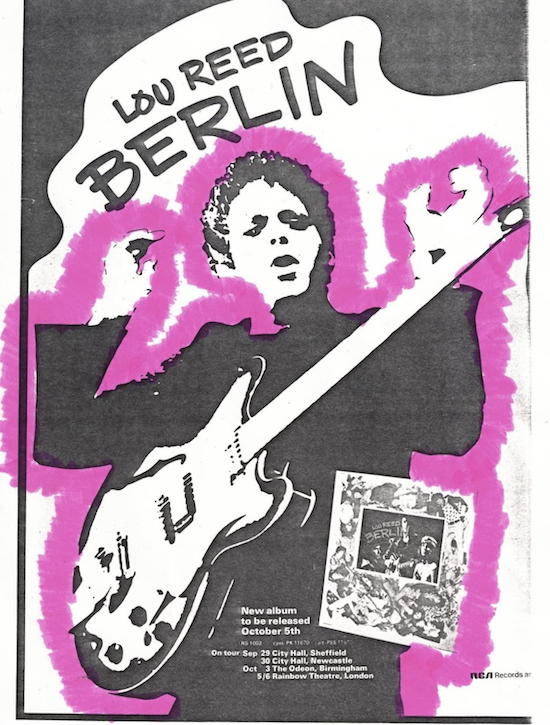
Reed brought the grit, Ezrin, brought the grandeur. Reed saw Berlin as an opportunity, he’d tell the NYT in 2006, “to apply novelist’s ideas and techniques into a rock format”, developing a style that was as blunt as Chandler, as melodramatic as Tennessee Williams, as forbidden as Hubert Selby Jr. But inside Reed’s folky sketches Ezrin also heard the “soundtrack to a non-existent movie”. He spent a month working on the arrangements, devising an elaborate sound design, bejewelling the ten songs with widescreen arrangements, opulent orchestrations full of solos, digressions and interludes bridging the songs together. It would be stretched across a double album, featuring a lavish booklet with text and accompanying images. There was talk of putting it on the stage too. It would be a tragic rock opera on a grand scale with Ezrin likening it to Puccini.
Cinematic, novelistic, operatic and theatrical – Berlin indeed came with lofty aspirations. Despite this, RCA were no doubt reassured by Ezrin’s success with Alice Cooper. Since 71’s Love It To Death, Ezrin-produced chart smashes which wrapped dark material in experimental, filmic soundscapes (‘Ballad Of Dwight Fry’, a musical mini-movie used Alka Seltzer dissolves for explosions). But Ezrin was mesmerised by Reed’s talent. Commercial considerations went out the window. The producer told the NYT in 2006 that “[I] maybe lost sight of my mandate. I didn’t do what I was hired to do”. Reed wasn’t interested in making a hit-stuffed Transformer sequel either. He just hoped Ezrin would add "punch" to his "sledgehammer images".
Recording commenced, summer 73, at London’s Morgan Studios, where Reed had cut his solo debut, impressed by Rod Stewart’s ‘Every Picture Tells A Story’, while singing, or rather Reed’s “dramatic readings”, were done largely at NYC’s Record Plant. Ezrin arrayed a company of top-shelf Anglo-American players. For drums, he first enlisted Procol Harum’s BJ Wilson; moving on to Aynsley Dunbar, who’d been replaced by Mick Fleetwood in John Mayall’s Bluesbreakers for being “too busy.” Bass was largely provided by Cream’s Jack Bruce, whose sensitive performances were prompted by his interest in seeing Reed’s words. (Tony Levin, who’d eventually work with Peter Gabriel and King Crimson, played on ‘The Kids’.)
Reed played acoustic, while Alice Cooper sidekick Dick Wagner and Detroit’s Steve Hunter provided an electric rock snarl, sporadically unleashed like a symphonist’s motif. But much of Berlin’s textures came from outside the standard rock set-up. Keyboards were centre-stage, with Traffic’s Steve Winwood supplying organ and harmonium; while piano came from Ezrin, Allan Macmillan and Blue Weaver (Bee Gees, Mott The Hoople). There were synths and mellotrons and brass from the Brecker brothers, Randy and Michael. Ezrin topped things off with an orchestra, woodwind, a violin-free string section and a choir (fellow Canadian Gene Martynec came up with the choral arrangement on ‘The Bed’).

London in 1973 was, Ezrin says, “hotter than a pistol”, a city teeming with pop culture where Bowie was king. The star would drop by the sessions with Ronson, while Reed, eyes blacked out by shades, cigarette in one hand, coffee in another, often arrived with an entourage of “rock stars, painters, poets, philosophers from the underworld of London culture.” The atmosphere for the dozen 20-hour sessions was "emotionally hyper-charged", partly because of the personal demons invited along as plus ones. “Everybody was messing around with stuff they shouldn’t have been messing around with,” said Ezrin to PBS in 1997. He was going through a period of marital strife then, adding that the recording “pulled the very best and very worst out of all of us”. The commitment to bringing the heavy subject matter to life took them to extremes. For ‘The Kids’, Ezrin recorded his two sons wailing for their mother on a Nagra tape machine, distorting and compressing the sound to nail-biting effect. Crying as if they’d been locked out of the house, it was so agonising people assumed Ezrin had told them their mother was dead.
At the eleventh hour, RCA nixed the double album idea, leaving 14 minutes on the cutting room floor. Berlin’s 8-track and cassette offered a glimpse of the original concept – a short, florid passage featuring Macmillan’s piano, plus keyboards and guitar sandwiched between ‘Berlin’ and ‘Lady Day’ (it bridged the album’s two sides when Reed staged Berlin in 2006). Intensifying the cinematic drama, foregrounding Berlin’s prog factor – it could have fitted snugly onto Genesis’ The Lamb Lies Down On Broadway – the piece also suggests the lost instrumentals were theatrical relief from tense narrative. ‘Caroline Says I’s outro collision of powerhouse band and chattering orchestras suggests Ezrin even superimposed parts to shrink the running time. Sadly, the original director’s cut has never been restored. Frazzled by the entire process, Ezrin would spend time afterwards in a psychiatric institution. “It was a heroin rebound,” he’d say in 1992.
Anticipation swirled around Transformer’s follow-up. In September, Rolling Stone featured a progress report by Larry "Ratso" Sloman entitled Lou Reed’s ‘New Deco Disk A Sledgehammer Blow To The Glitterbugs’. "This is going to destroy them", warned Reed, while Sloman declared the upcoming release to be “the Sergeant Pepper of the 70’s”; praise repeated on Berlin’s vintage movie-style ads, which also promised "a film for the ear".
Berlin hit American record stores 5 October. The sleeve, a Pacific Eye and Ear design, featured a leather jacketed Reed flanked by Caroline and Jim, the haunting black and white boxed portrait surrounded by a sepia-like collage of bodies entwined, shot from above, resembling a giant human wreath, or human garbage. Annie Leibovitz’s similar Fleetwood Mac portrait on a Rolling Stone March 1977 cover was another snapshot of the orgiastic, incestuous 70s. Title and author were scrawled in passionate blood-red graffiti on a cover that aestheticized Berlin’s tensions, its street-tough cold eye, its big, grand beating heart. Initial copies came with a more modest version of the planned booklet, eight pages of handwritten lyrics with accompanying images of Caroline and Jim, and dingy hotel rooms.

The record inside opened with the title track. Radically reworking the original song, all sweetening passages were mercilessly wiped, the refrain, oddly evocative of Elektra singer-songwriter David Ackles at his most romantic, the proto-Tubular Bells guitar breaks, the coda’s breezy pure pop gear shift. Only the verse remained, as Caroline and Jim’s existential love theme, in an apocalyptic cocktail jazz cafe setting. The introductory cacophony of birthday party and air-raid squall neatly places the desolate bohemia in a world ravaged by war. Allan Macmillan hammers away intensely at the ivories, playing that’s both lyrical and severe. Wistfully intoxicated by past love, hardened by its bitter outcomes, Reed’s performance recalls the voiceovers from the ill-fated chumps of film noir as the action flashes back.
‘Lady Day’ does just that, to Jim’s first encounter with Caroline. The title’s a nod to Billie Holliday, who’d recently been the subject of the 1972 Diana Ross vehicle, Lady Sings The Blues. It’s a disorienting swirl of high times and low living, casting Caroline as a modern day Pirate Jenny (Weill/Brecht). Lushly orchestrated cabaret recalls Transformer’s jazzy, vaudevillian struts, but now cast in oversaturated, fabulously queasy hues, as sickly as Caroline’s “greenish” walls, the colour of Jim’s future jealousy. The seedy organ provides noir menace, Reed alternates between cool observer and double-tracked, borderline hysteria. ‘Men Of Good Fortune’ is Jim’s soliloquy, a lament on the rock-solid class structures he’s fatalistically resigned to. Meritocratic myths are punctured, contradictions exposed; the suicidal impulses of the rich son and the steely determination of the poor one. It’s languidly soulful and staccato mean and lean, like Reed’s sorrowful, stoic vocal.
‘Caroline Says I’ is Jim’s deceptively upbeat love-letter to his “German queen”, a bouquet of roses and thorns (like Lou Reed’s name on that 72 debut), a galloping anti-ballad swamped in deliciously syrupy super 70’s orchestration. Bitterness taints the sickly co-dependant sweetness, hinting at a violence that will soon erupt within Jim, the emasculated man-child. It’s a romp of marital discord worthy of Taylor/Burton; theatrical, blackly humorous, gut-wrenching. ‘How Do You Think It Feels?’ descends into Jim’s hell, finds him “speeding and lonely”. Stark piano and bass accompanies the personal (could it be ripped from Lou Reed’s diary for 1973?) It’s puffed up by tawdry razzle-dazzle, a rocking show tune bump and grind, the false fun of a desperate high (this cri de Coeur, hiding behind black shades in a black leather jacket was a US single).
‘Oh Jim’ sinks deeper, its tribal beat and brass blasts predating Fleetwood Mac’s Tusk by six years, a mechanical, ominous grind with a throbbing synth line and a Reed vocal as casually ferocious as 1974’s put-down of ‘N.Y. Stars’. Here Jim’s corrosive self-pity spills over into physical abuse. He’s revealed to be an unreliable narrator too. Perspectives shift with the eerily poignant acoustic postscript, sung by Caroline, hardly the imperious monarch from two songs ago. Drenched in reverb, lamenting the ghost of a romance, it flashes back to rock & roll past (Presley’s spooky Sun Studio recordings) and forward (resembling Suicide unplugged).
The second side documents Caroline and Jim’s final chapters with forensic, sad, savage detail; a narrative cohesion lacking in most so-called concept albums. ‘Caroline Says II’ is ‘Perfect Day’ in a broken mirror, verses of domestic abuse not idyllic day-trips, its similarly swelling chorus full of suicidal, speed-freak heartbreak not romantic rapture. Wind chimes shimmer as Caroline’s fist goes through the glass, reflecting a mind too drug-addled to feel the shards. This time the orchestra comes from a mellotron, its glacial artifice thawing with that searing climax. Full of what Ellen Willis elsewhere called Reed’s “distinctive cosmic sadness”, ‘Caroline Says II’s mental anguish comes with shivering intensity. In some parallel universe this would have kept Nilsson’s ‘Without You’, Don Maclean’s ‘Vincent’, James Taylor’s ‘Fire And Ice’ and The Carpenters’ ‘Hurting Each Other’ company in the charts; a hit that never was from the deep, sad 70s.
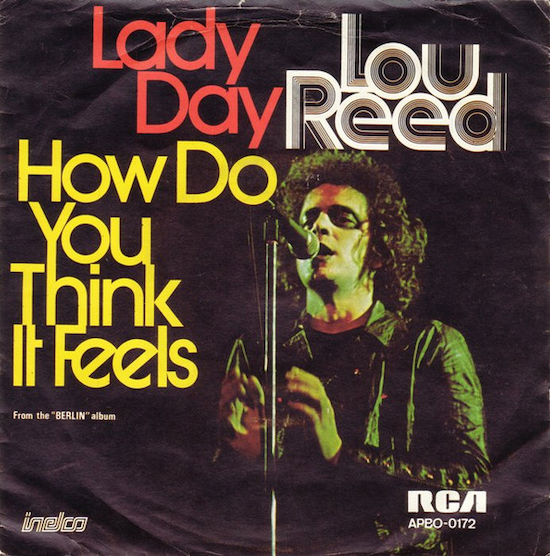
‘The Kids’, is arguably Berlin’s cornerstone, Jim cataloguing Caroline’s promiscuities and infidelities, as their children are taken away. Sonically, its drop-out London, ragged nursery rhyme folk, crumbling like the white stucco W11 dens of junkie bohemia. Critics only heard Jim’s callous, gloating contempt, his seething misogyny, but possibly missed the fragility, trembling with a regret too overwhelming to be fully expressed. These subtle touches, and very uncomfortable complexities made Berlin easily misunderstood. The album cast Reed, like Billie Holiday, as someone limited in range though endlessly expressive, such an affecting vocalist. Those sobbing children, dramatising Lennon’s larynx-shredding climax on ‘Mother’ (a Reed favourite), give way to Berlin’s most devastating moment: Jim, alone with an acoustic guitar in a luminous spotlight, a tired mess of overflowing heart and feigned happiness. But how much of Reed was there in Jim? The musician’s biographer Howard Sounes would eventually brand him a "monster", when he tallied the stories of violence meted out to women, although others, who knew Reed well, branded him an unreliable narrator, pointing out that some of these stories pedalled by the musician himself, weren’t necessarily to be trusted.
‘The Bed’, Jim’s druggy, dreamlike state merges past joys (children conceived by candlelight) with present horrors (Caroline’s suicide). Razor sharp reality sporadically pierces the baroque lullaby, an acoustic setting, enveloped by spectral female voices and a mellotron-heavy soundscape. Leonard Cohen’s brooding boudoir-set folk-ballads come to mind, with their siren-like backing vocals (note the poetry on Caroline’s shelf). Reed was a fan, telling biographer De Curtis, “Cohen always seems wise, the people in my songs are not wise. They’re in the middle of a battle. I always thought things were better in a conflict.” Comparing them to Johnny Boy from 1973’s Mean Streets, Reed’s characters were like "a piece of metal caught in a magnet, [facing situations] way past your ability to control – whether you know it or not." ‘The Bed’ veers towards the phantasmagorical, gothic, choral/orchestral arrangement recalling Les Baxter scores for Roger Corman’s Edgar Allen Poe adaptations, that master of the macabre so beloved by Reed. The final eerie sonic swarm echoes the diabolical buzz used in the sound design of that year’s The Exorcist.
‘Sad Song’, is Berlin’s final orchestral flourish, with heavenly choirs, strings spiralling, like Aaron Copland’s symphonies venturing into new world frontiers, electric guitars soaring skywards. But Jim’s world has shrunken. He’s like Marlowe walking away with just a harmonica to hold on to by The Long Goodbye’s finale, gazing at photos of a shattered family, unconvincingly determined to stop wasting time. Chafing at his picture book nostalgia are misogyny and regret; messy, unpleasant emotions inside a sentimental showstopper as Walt Disney-extravagant as The Beatles’ ‘Good Night’.
There could be a grim irony at work – in 1998 Reed called Berlin a black comedy. The song could be the soundtrack to Jim’s own dying moments, an ascension. Like Mean Streets’ denouement, with Charlie, shot, emerging from a crashed car, kneeling before a spraying hydrant, ‘Sad Song’ could be a redemptive soul-cleanser for a wretched protagonist. Warren Zevon – another musician and domestic abuser with a permanently stained reputation – wrote ‘Desperadoes Under The Eaves’, itself festooned with orchestras and choirs, equally triumphant and downtrodden. In the chaotic 1970s there were few tidy, unambiguous endings.
Berlin has often been seen as an unmitigated failure, shunned by the public, reviled by critics. Rolling Stone’s Stephen Davis, dismissed it as “a career-ending disaster”, suggested it was so “patently offensive” bodily harm might be warranted for its author. But Timothy Ferris’ Rock ‘n’ Roll Animal, review months later in the same magazine contained a rebuttal, arguing art needed no moral compass.
NYT’s John Rockwell praised its striking originality. Circus said it was "the most affecting rock effort in recent memory". NME’s Nick Kent saw it as "a coup", a return to form after Transformer, though he had reservations about its flight from rock’s boundaries. Ambivalence ran through peers’ verdicts too, with head Doll David Johansen, claiming in December’s Phonograph Record, that Reed was “bullshitting” the kids, hoping to pull off a “vindictive, moralistic” un-rock move.
Davis’ drubbing did cast a huge shadow over the record and stateside it stalled at 98. The stage-show was swiftly shelved. Post-Pepper’s, grand ambitions were fine but when wedded to such bleak, uncompromising material, the combination was lethal. In Britain though it soared to 7, his highest placing yet. Post-Transformer momentum perhaps but UK pop, 73-style, was often odd, grand, crude. It was falling "wanking to the floor" on Bowie’s ‘Time’, canoodling with inflatable dolls on Roxy’s ‘In Every Dream Home A Heartache’.
Reed cited Othello and Hamlet when defending Berlin’s tragic depiction of humanity’s ugly side. The "film for the ear" had much in common with the period’s cinema too, specifically that of New Hollywood. Aesthetically and topically challenging, these films were heavily influenced by Europe, full of flawed, anti-heroes, as they addressed American reality not the dream.
Berlin exerted a greater influence over British pop culture than it did America’s. Reed may have escaped Mainman’s clutches but when Diamond Dogs appeared six months after Berlin, it had given the decadent dystopian sonic stage-show a lurid Marvel Comics paint job. Pink Floyd’s The Wall, produced by Ezrin, owed something to Berlin too, from the barricade of its title to ‘Comfortably Numb’s ‘Sad Song’-style orchestration. Both Marc Almond (with the Mambas) and Siouxsie (with Suede) covered ‘Caroline Says II’.
Suede’s own Dog Man Star was inspired by Berlin, another grand, chart-unfriendly, anti-glam statement, coming hot off the heels of a hit album. The sweeping structure mirrored Berlin’s, with a slow-mo four track final section, climaxing with its own orchestral bombast, ‘Still Life’. Even the artwork’s bedroom-bound green hues recalled Caroline’s walls, the sad, unsettling, arty images accompanying the lyrics uncannily similar. Guitarist Bernard Butler, who based ‘Daddy’s Speeding’ on parts of How Do You Think It Feels’, spoke of how Berlin "draws you in".
Even those involved baulked at Berlin. According to Reed, “like isn’t the right word for it”. Ezrin claimed Reed couldn’t listen to it for years, that it made him “want to hide in a closet.” When Kronstad finally left Reed as the 1973 tour rolled into Paris, she returned home and purchased Berlin. The record store worker suggested she reconsider saying “people are returning it, it’s so depressing.” Lester Bangs agreed, calling it “the most depressed album”, a reductive view of a perversely beautiful, oddly uplifting album.
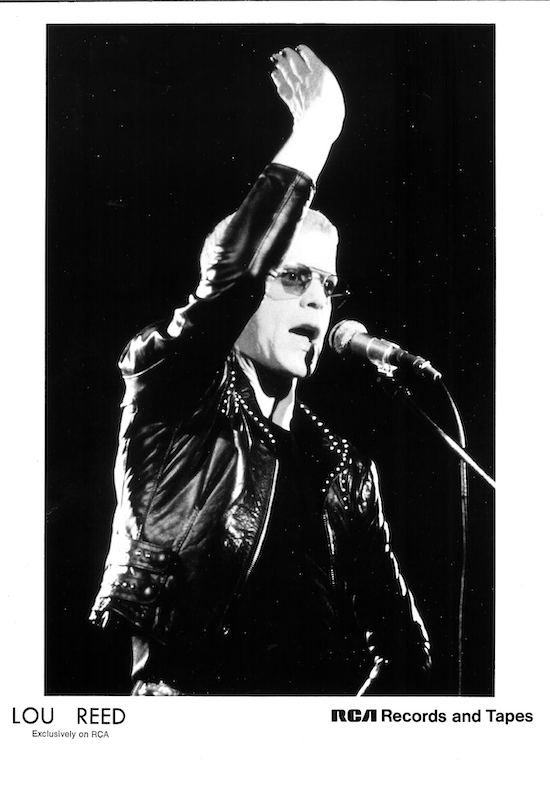
Reed quickly fled its shadows though, donning fiercely gay attire, cropping his hair, unleashing his biggest stateside success to date, the 1974 Velvets-heavy live album, Rock ‘n’ Roll Animal. If one image invented punk, then the album’s bestial blur of a sleeve is it. The same year’s Sally Can’t Dance, a US top 10, fared even better. But Reed would continue to confound, with Metal Machine Music.
With Ezrin in tow, Reed would eventually, in 2006, stage Berlin, with sets designed by Julian Schnabel, film projections and support from Anohni and Sharon Jones. Taking the production from NYC’s St Ann’s Warehouse to Australia, this time Berlin was rapturously received with Bowie, Peter Gabriel, Annie Lennox, Daniel Craig and Rachel Weisz attending.
Ezrin praised Reed for his synecdoche, his knack of expressing big ideas via small ones. Berlin does just that, being a microcosm of the glam/glum 70s, its unstable relationship and unreliable narrators, indicative of the era’s deep uncertainty, spinning in myriad directions, while America was ravaged by Vietnam and Watergate. There was a sense of things coming apart, of shibboleths crumbling. It embodies the spirit of a decade that started with both The Beatles’ split and Reed’s own exit from the Velvets. It was an age when everything was unravelling, and it was embodied by the break-up album, but like all the great tragedies, Berlin is timeless, universal, an eternal paean to what Julian Schnabel called “love’s dark sisters – rage, jealousy and loss.”

